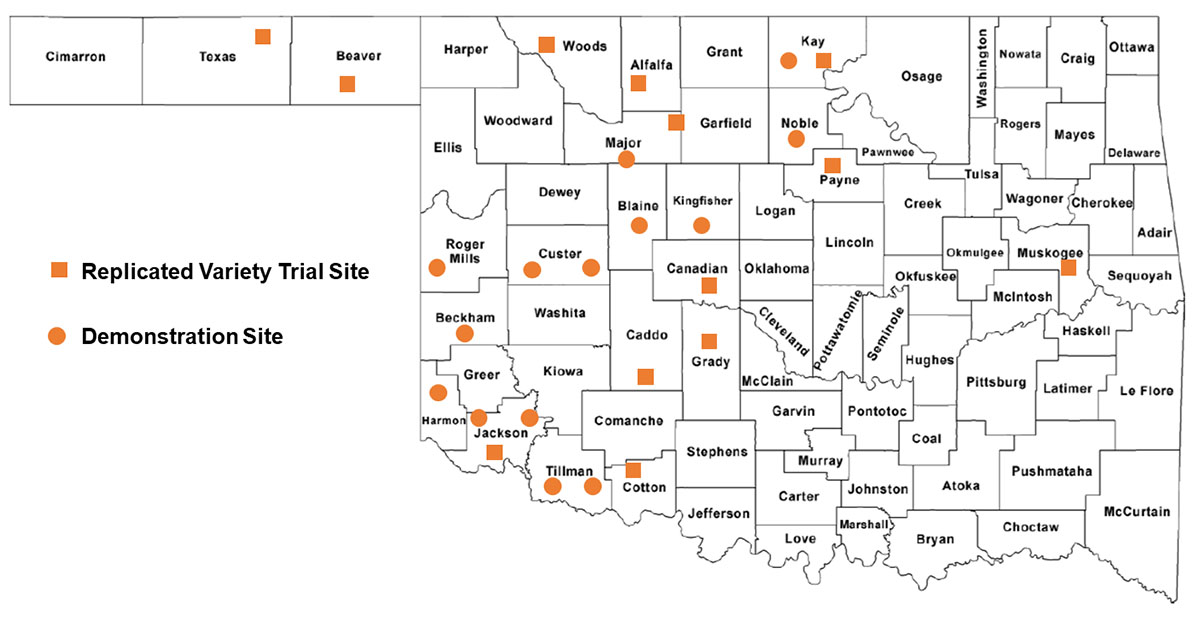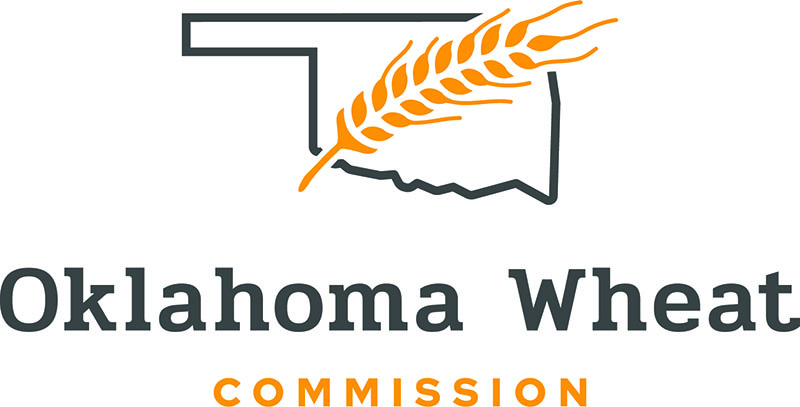Impact of the OSU Wheat Variety Testing Program
Public/Private Ownership
The OSU Wheat Variety Testing Program has a proven track record of leveraging state and commodity support to obtain larger federal grants. The Oklahoma Cooperative Extension Service and Oklahoma Agricultural Experiment Station provide baseline support for the program with salaries and services. From 2012 to 2022, the Oklahoma Wheat Commission and Oklahoma Wheat Research Foundation invested a total of $430,000 in producer check-off funds into the program. The baseline programs supported by these funds were leveraged to help secure over $3.9 million in competitive funding to wheat research over the same period.
Unique & Important Data
Wheat production in Oklahoma is unique and Oklahoma farmers need varietal data such as fall forage production, ability to germinate in hot soil conditions, coleoptile length, acid soil tolerance, lateness of first hollow stem, tolerance to grazing by cattle, grain yield potential and protein. These characteristics are critical for adaptation to Oklahoma but are evaluated by very few variety testing programs. In fact, most surrounding states and many private companies rely on the OSU Wheat Variety Testing Program to supply this knowledge for their dual-purpose wheat producers.
Local Control
While the scope of the OSU Wheat Variety Testing Program is statewide, the direction of the program is heavily influenced by local control and decision making. OSU area agronomists and county Extension educators work with local producers and state staff to determine variety trial entries, cooperators and locations. These individuals are the eyes, ears and strong backs of the variety testing program and ensure that research and Extension programs coincide with local needs.
Economic Impact
Farmers and decision makers place a high value on data generated by the OSU Wheat Variety Testing Program. Attendees of wheat variety field days in 2022 represented 582,327 acres or about 13% of the entire 2022 OK winter wheat planted acreage. When asked, 100% of attendees indicated the information they received at these field days would influence their wheat variety choice the following year. Producers placed a value on the information they had just received during the field day at an average impact of $37 per acre for their farming operations for a total impact of just over $22 million. Annual farmer investment in the wheat variety testing program in the form of check-off funds is approximately $45,000. This is an extraordinary return on investment for wheat producers.
Communication
The OSU Wheat Variety Testing Program has research and demonstration sites throughout Oklahoma. From Walters to Hooker, we have a presence in the major grain-producing regions of Oklahoma. Variety trial data are posted on the OSU Small Grains Extension website (www.wheat.okstate.edu) within a few days of harvest and distributed directly to over 8,000 Oklahomans via the Wheat Seed Book published by High Plains Journal and 1,800 subscribers of The Wheat Farmer/Row Crop Farmer Newsletter. Producers are kept up to date on pest management issues and crop development via the Plant and Soil Sciences Extension Newsletter with 1,400 subscribers, OSU Wheat Blog (The World of Wheat) and Twitter (@OSU_smallgrains) currently with 8,239 followers.
Environmental Stewardship
Unwarranted pesticide applications are costly for the producer and potentially harmful to the environment. The OSU Wheat Variety Testing Program provides wheat farmers timely information on developing weed, insect and pathogen problems via traditional and web-based media outlets. Integrated pest management recommendations along with current variety ratings for disease and insect resistance help producers make pesticide applications in a sustainable manner that will maximize profitability and minimize environmental impact.
The OSU Wheat Variety Testing Program has research and demonstration sites throughout Oklahoma. From Walters to Hooker, the program has a presence in the major grain producing regions of Oklahoma.
Highlights
- $430,000 in producer checkoff funds leveraged to secure over 3.9 million in competitive funding
- Field day attendees represent over 582,000 acres annually
- Average perceived value of information provided at field days was $37 per acre
- A $45,000 annual investment of producer checkoff funds results in over $22 million in perceived impact by producers
- Research and demonstration sites cover major wheat producing regions of Oklahoma
- Data are posted on www.wheat. okstate.edu within a few days of harvest
- Results are shared directly to over 8,000 Oklahomans via popular press inserts


